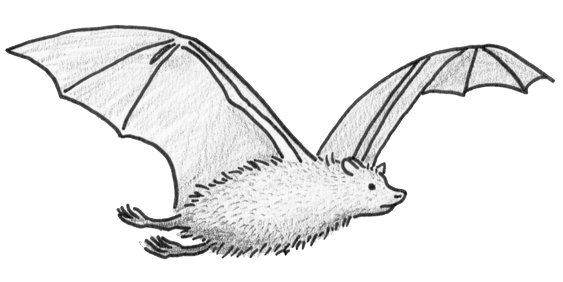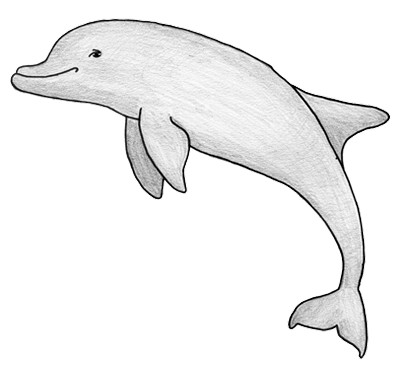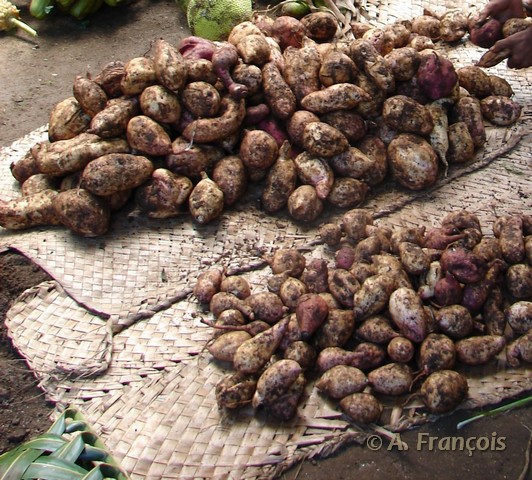kaka kaka verb, intransitive
reach, achieve one's goalatteindre, arriver jusqu'à (un endroit)
| Jo re jo v̈a m̈ar̄a-n r̄e jara, o pa kaka ngisa?Supposing we leave from the same point, when will you reach (the other side)?En supposant que nous partirions d'un même point, quand arriveras-tu (de l'autre côté)? |
kam kam subject prefix
Grammar
we (Exclusive): First plural Exclusive Subject personal pronoun, associated to Realis moodnous (Exclusif): pronom personnel sujet 1ère p. pluriel exclusif, associé au mode Realis
| Na r̄olu na r̄asi-ku, na r̄oha-ku kam soro meje sa-m.I, with my younger and elder brothers, we would like to thank you. |
| Nam lesi-a r̄aju mo hese, kam rua sorosoro.I saw a man, and we (two) had a chat.J'ai rencontré quelqu'un, et nous nous sommes mis à discuter. |
| Kam skul m̈alue kam sivo, kam sivo kam varai-a nia.As we were going out of the church, we went down there and explained everything to him. |
kam̈a kan̼a subject prefix
Grammar
we (Exclusive): First plural Exclusive Subject personal pronoun, associated to Irrealis moodnous (Exclusif): pronom personnel sujet 1ère p. pluriel exclusif, associé au mode Irrealis
| Kam̈am r̄apuro r̄olu kam̈a sivo ngoro.The three of us are going to sleep.Nous trois, nous allons nous coucher. |
| Kam̈a opo-i vara kam̈a lesi nar̄u-m.We would love to meet your son. |
kam̈am kan̼am personal pronoun
PNCV*gam(am)i
Grammar
we (Exclusive): First plural Exclusive independent pronounnous (Exclusif): pronom personnel indépendant, 1ère p. pluriel exclusif
| kam̈am povi rai vunguvungu-ni Moliall of us, Moli's familynous tous, la famille de Moli |
| Kam̈am Raki kam je levsei inumi-a hae.We, people of Araki, we do not usually drink kava.Nous autres à Araki, nous ne buvons pas tellement le kava. |
SyntaxeComme pour kam̈im, le pronom kam̈am est également utilisé comme objet, à la place normale des suffixes.
Synt.Just like kam̈im, the pronoun kam̈am is also used as an object, instead of suffixes; however it behaves like an autonomous NP: Nia mo sov kam̈am r̄o. He is awaiting us.
see-m̈am
kam̈im kan̼im personal pronoun
PNCV*gamuyu
Grammar
you: 2nd plural independent pronounvous: pronom personnel indépendant, 2ème p. pluriel
| Kam̈im po ha ngingisa!Come on, all of you, smile!Vous tous, faites un grand sourire ! |
| Niko kam̈im r̄olu nanar̄u-m.You and/with your kids.Toi et tous tes enfants. |
SyntaxeComme pour kam̈am, le pronom kam̈im est également utilisé comme objet, à la place normale des suffixes.
Synt.Just like kam̈am, the pronoun kam̈im is also used as an object, instead of suffixes; however it behaves like an autonomous NP: Nam varai kam̈im nam re ha v̈a hojo lim̈a-m̈im! I told you to wash your hands!
see-m̈im
kan kan Tense Aspect Mood marker
1 – must not, should notne pas devoir
| Na kan sa lo ima-na.I should not go to his house.Il vaut mieux que je n'aille pas / je ne dois pas aller chez lui. |
2 – esp2nd personmarks a negative order: Prohibitivepartic2ème personnemarque de l'ordre négatif, de l'interdiction
| Ha kan m̈an p̈ala-i-á!Don't (y'all) make fun of me !Ne te moque pas de moi ! |
| O kan kore-i-á! — Nam je kore-i-ko.Don't you lie to me! — I am not lying to you.Ne me mens pas ! — Mais je ne te mens pas. |
kara kaɾa noun

PNCV*garaiflying-fox
Fauna
flying-fox, kind of large fruit batroussette, sorte de grosse chauve-souris frugivore
seehariv paurouro
karai kaɾai noun
Anthropology
chief. One of the dignitary ranks in the customary societychef. Un des rangs de dignité dans la société traditionnelle
karu1 kaɾu verb, intransitive
PNCV‹°garuPOc*karuswim, bathe*(k,g)aʀu
swim, bathe
| Mo r̄o om je opoe karu lo ai?Why don't you like bathing in the river?Pourquoi n'aimes-tu pas te baigner dans la rivière? |
| Nam je rongo na karukaru lo r̄asi, m̈ar̄a p̈ahe.I don't feel like bathing in the sea because of the sharks.Je n'ai pas envie d'aller nager en mer, à cause des requins. |
| Hariv mo karu karu karu karu karu, mo lesi-a p̈ahe.And the Rat swam, swam, swam, swam… until he saw a shark. |
karu2 kaɾu verb, transitive
PNCV*garuscratch
trkarumi-
scratch, scrape, rubgratter, frotter
| R̄aju mo hese mo karumi-a laho vinini.Someone was scraping the palm tree trunk.Quelqu'un était en train de gratter le tronc du palmier. |
| Mo var̄i-a pallaje lo r̄asi, mo karumi-a hovi-na.He went looking for sea coral, and rubbed his infected skin with it.Il alla chercher du corail en mer, et en frotta sa peau malade. |
kaur̄a kaura adverb
POc*qutanbush, forest
up, aboveen haut
| Mo vur̄ivur̄ia-ha mo sa kaur̄a.(the stone) soars up high in the sky.(la pierre) s'élance et monte très haut. |
| V̈apa ri mo r̄oho sahan kaur̄a.This cave is up there in the hills.Cette grotte se trouve là-haut, sur les hauteurs. |
| Mo var̄i-a ra-holo mo plan-i-a kaur̄a hinia.(after picking the breadfruit) they take coconut palms and throw them over it.(après avoir déposé le fruit-à-pain) on prend des palmes de cocotiers et on les jette dessus. |
| Kam opo-i vara o sohan-i-a lo adres sa-su-n kaur̄a.We would like you to send it to the address mentioned above.... ci-dessus. |
| hurivivi-ku kaur̄amy upper lip |
kavula kaβula noun, relational
PNCV*vulebreadfruit flower or core
inedible pith in the middle of breadfruit (levu), to which the seeds (p̈iri-na) are attached
| Mo vahuren-i-a kavula-na, vahuren-i-a p̈irina...They take away the pith, take away the seeds... |
kere keɾe noun
PNCV*gerebottom, butt, tail
Redupkerekere
bottom, tailextrémité inférieure, queue
| kere-heja[blue-tail] Bluespot mullet, a fish |
| kerekere m̈ar̄abags under eyeszone sous les yeux, cernes |
kere-heja keɾeheʧa noun
Fish
blue tailBluespot mullet, reef fish, 50 cmqueue bleueMulet à queue bleue (angl. Bluespot mullet), poisson récifal, 50 cmValamugil seheli.
kesikesi kesikesi
keskesi
adverb
Grammar
right nowmaintenant
| Nam pa lesi r̄asi-m kesikesi.I am meeting your brother for the first time [pa] right now. |
seekesi
kia kia
Aadverb
there, at that place: anaphoric locative adverblà, à cet endroit. Adverbe anaphorique à valeur locative
| Mara Naur̄a lap̈a mo sivosivo velu r̄o kia.The people from Santo would go there to dance.Les gens de Santo s'y rendaient pour y danser. |
| R̄aju hosun mo r̄oho kia nira-n venar̄u-na.This man was living there with his wife.Cet homme habitait là avec sa fille. |
| Vara om poe-i-a o r' o pa r̄aju-lap̈a, o levse sa kia.Suppose you want to become a chief, you can go there (and ask the oracle). |
Bpredicative
Existential predicate for specific referent (vs. r̄e "non-specific Existential"): there is. Used mainly in affirmations
| Lo jara-m, r̄e r̄am̈ar̄e vo mo je r̄e? — R̄am̈ar̄e kia.In your country, are there devils or not? — Yes, there are.Dans ton pays, il y a des Esprits ou non ? Oui. |
| R̄e paniavu lo ima r̄ur̄un? — Nia kia.Is there some pineapple in the kitchen? — Yes, there is. |
kila kila
kla
verb, intransitive
1 – +directional marker (v̈a, m̈a, sa, si)watch, look (in a certain direction)+verbe directionnel (v̈a, m̈a, sa, si)regarder, observer
| M̈ala mo kla v̈a mo lesi-a jam.The hawk looked and saw the piece of yam.Le faucon regarda et vit le morceau d'igname. |
| P̈ir̄a hosun mo rongo mo le sihir̄ mo sivo mo kla si mo lesi-a.When she heard him, the woman ran to look, and saw him.En l'entendant, la femme courut pour le regarder, et le vit. |
seelesvoirsee
klav̈as klað̼as verb, intransitive
watch, look atregarder, observer
| Mo klav̈as mo les naho-n r̄ap̈ala-na.He watched and recognised the face of his friend.Il leva les yeux, et reconnut le visage de son compagnon. |
seelesvoirsee
klin klin adjective
clean, healthypropre, sain
| Hovi-na mo jiha povi, mo klin mo vokovoko.His scabies had totally disappeared, he was now clean and healthy.Sa gale avait complètement disparu, il était sain et propre. |
synonymvokovoko
-ko ko object suffix
Grammar
you: Second singular Inclusive Object suffixte, toi: suffixe personnel objet 2ème singulier
| R̄aju mo v̈ei-ko, nia Supe.The one who created you is God.L'être qui t'a créé, c'est Dieu. |
| O kan kore-i-á! — Nam je kore-i-ko.Don't you lie to me! — I am not lying to you.Ne me mens pas ! — Mais je ne te mens pas. |
| Nam rongo na sile-ko n-r̄e hina.I feel like giving you a present.J'ai envie de te donner un cadeau. |
koho koho verb, intransitive
treehollow, rottenarbrecreux, évidé
| Viha hosun, viha hetehete, mo r̄oho pan mo koho, ai mo tup lolo-no.This tree was small and hollow, always full of water.Cet arbre, c'était un petit arbre creux, avec son trou toujours rempli d'eau. |
synonymr̄ungu-ha
koko koko noun, relational
holetrou, orifice
| koko ngalsu-nahis nostrilsses narines |
| Nra mo heli-a koko lo jar̄auta.They dig a hole on the shore.Ils creusent un trou sur la plage. |
| Pasta mo sahara sivo lo koko-n viha nosun, ai mo r̄oho kia.The Clergyman stretched out his arm into the hollow tree, where the water was.Le Pasteur avança la main dans le trou de cet arbre, là où l'eau stagnait. |
kore1 koɾe
koro
verb, intransitive
Redupkorokoro
1 – lie, tell lies
| R̄aju mo korokoro mo je holo-ho.It's bad to lie [That one should lie is bad].Le mensonge, c'est mauvais [Qu'un homme mente est mauvais]. |
kore2 koɾe verb, intransitive
hollow out, remove substance, e.g. making a canoecreuser, enlever de la matière, par ex. en fabriquant une pirogue
| Mo kore mo r̄ai hototom̈e aka-na.He hollowed out (the wood), and made a perfect canoe.Il creusa (dans le bois), et réalisa parfaitement sa pirogue. |
kori koɾi noun
yam stick, used when cultivating this tuberbâton à igname, utilisé dans la culture de ce tubercule
korongo koɾoŋo adverb
maybe, probablysans doute, peut-être
| Pasta mo sna lo Sande, korongo so-n kesi.The Clergyman came here on a Sunday, probably like this one today.Le Pasteur vint un dimanche, sans doute comme aujourd'hui. |
synonympana
koru koɾu adjective
PNCV*gorudry, esp. of vegetation
1 – plant+dry, driedplante+sec, desséché
| Mo var̄i-a vivara r̄a koru.He takes a dry reed.Il prend un roseau sec. |
2 – burnt, suffered from firebrûlé, qui a subi une brûlure ou un incendie
| P̈isu-ku koru lo hapu.I burnt my fingers in the fire.Je me suis brûlé les doigts sur le feu. |
| Ima-ku mo r̄e koru, moli mo suli-a.My house has been burnt down, the chief set fire to it.Ma maison a été brûlée, le chef y a mis le feu. |
-ku ku possessive suffix
POc*-gu
Grammar
my: First singular possessive suffixmon: suffixe possessif 1ère singulier
| Ta, nam po-i-a vara o r̄ai r̄e aka-ku.Dad, I would like you to carve me a canoe.Père, je voudrais que tu me tailles une pirogue. |
| Rai m̈aji mo han-i-a ha-ku hina!The birds have eaten my meal!Les oiseaux ont mangé mon repas ! |
| Nam ele no-m soro na hase-ku.I learnt your language by myself.J'ai appris moi-même ta langue. |
| Sava hina jo pa m̈a isa-ku?What will happen to me?Qu'est-ce qui va m'arriver, quel sera mon destin? |
kue1 kue verb, intransitive
jump, leapsauter, bondir
| Hariv mo kue mo sa mo sara lo tar̄auta.In a single leap, the Rat went to sit on the shore.D'un bond, le rat alla s'asseoir sur la berge. |

